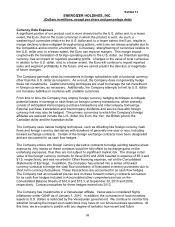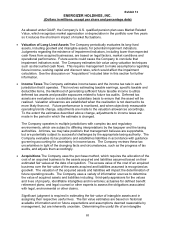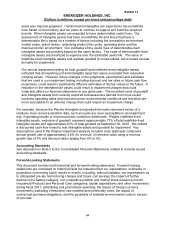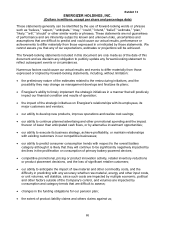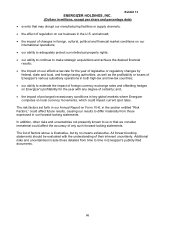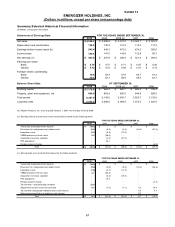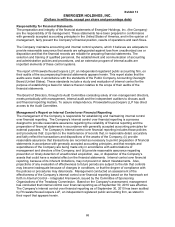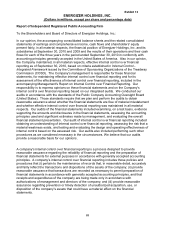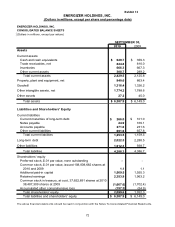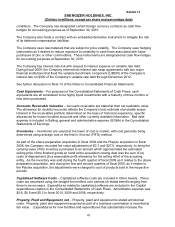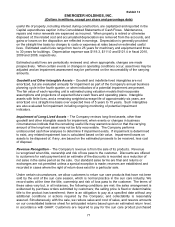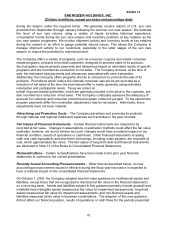Energizer 2010 Annual Report Download - page 78
Download and view the complete annual report
Please find page 78 of the 2010 Energizer annual report below. You can navigate through the pages in the report by either clicking on the pages listed below, or by using the keyword search tool below to find specific information within the annual report.
Exhibit 13
ENERGIZER HOLDINGS, INC.
(Dollars in millions, except per share and percentage data)
68
Responsibility for Financial Statements
The preparation and integrity of the financial statements of Energizer Holdings, Inc. (the Company)
are the responsibility of its management. These statements have been prepared in conformance
with generally accepted accounting principles in the United States of America, and in the opinion of
management, fairly present the Company’s financial position, results of operations and cash flows.
The Company maintains accounting and internal control systems, which it believes are adequate to
provide reasonable assurance that assets are safeguarded against loss from unauthorized use or
disposition and that the financial records are reliable for preparing financial statements. The
selection and training of qualified personnel, the establishment and communication of accounting
and administrative policies and procedures, and an extensive program of internal audits are
important elements of these control systems.
The report of PricewaterhouseCoopers LLP, an independent registered public accounting firm, on
their audits of the accompanying financial statements appears herein. This report states that the
audits were made in accordance with the standards of the Public Company Accounting Oversight
Board (United States). These standards include a study and evaluation of internal control for the
purpose of establishing a basis for reliance thereon relative to the scope of their audits of the
financial statements.
The Board of Directors, through its Audit Committee consisting solely of non-management directors,
meets periodically with management, internal audit and the independent auditors to discuss audit
and financial reporting matters. To assure independence, PricewaterhouseCoopers LLP has direct
access to the Audit Committee.
Management’s Report on Internal Control over Financial Reporting
The management of the Company is responsible for establishing and maintaining internal control
over financial reporting. The Company’s internal control over financial reporting is a process
designed to provide reasonable assurance regarding the reliability of financial reporting and the
preparation of financial statements in accordance with generally accepted accounting principles for
external purposes. The Company’s internal control over financial reporting includes those policies
and procedures that: (i) pertain to the maintenance of records that, in reasonable detail, accurately
and fairly reflect the transactions and dispositions of the assets of the Company; (ii) provide
reasonable assurance that transactions are recorded as necessary to permit preparation of financial
statements in accordance with generally accepted accounting principles, and that receipts and
expenditures of the Company are being made only in accordance with authorizations of
management and directors of the Company; and (iii) provide reasonable assurance regarding
prevention or timely detection of unauthorized acquisition, use, or disposition of the Company’s
assets that could have a material effect on the financial statements. Internal control over financial
reporting, because of its inherent limitations, may not prevent or detect misstatements. Also,
projections of any evaluation of effectiveness to future periods are subject to the risk that controls
may become inadequate because of changes in conditions, or that the degree of compliance with
the policies or procedures may deteriorate. Management conducted an assessment of the
effectiveness of the Company’s internal control over financial reporting based on the framework set
forth in Internal Control – Integrated Framework, issued by the Committee of Sponsoring
Organizations of the Treadway Commission. Based on the Company’s assessment, management
has concluded that internal control over financial reporting as of September 30, 2010 was effective.
The Company’s internal control over financial reporting as of September 30, 2010 has been audited
by PricewaterhouseCoopers LLP, an independent registered public accounting firm, as stated in
their report that appears herein.


